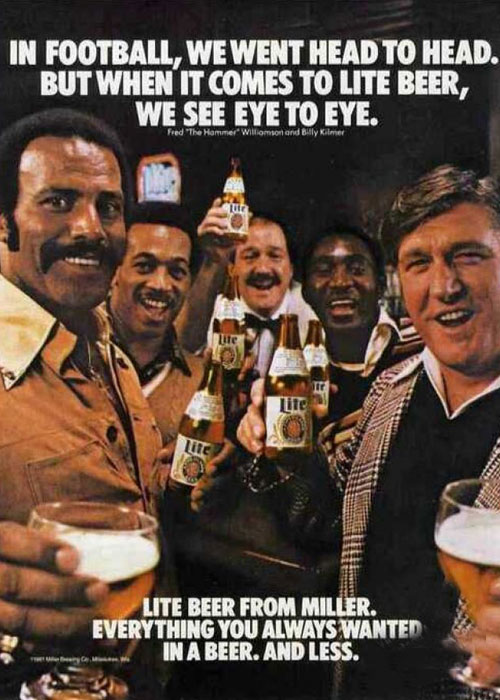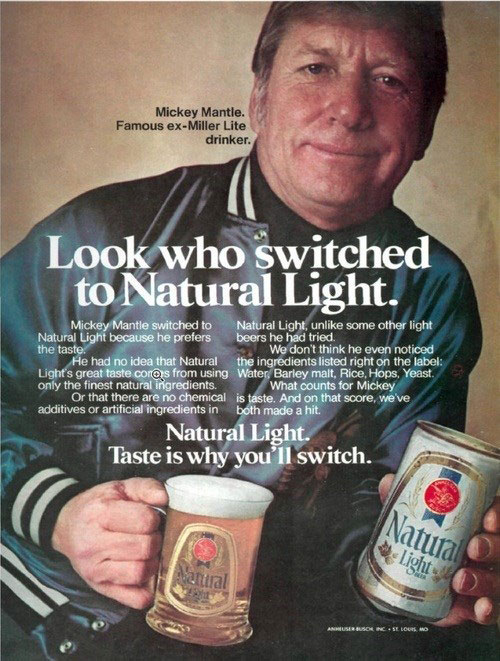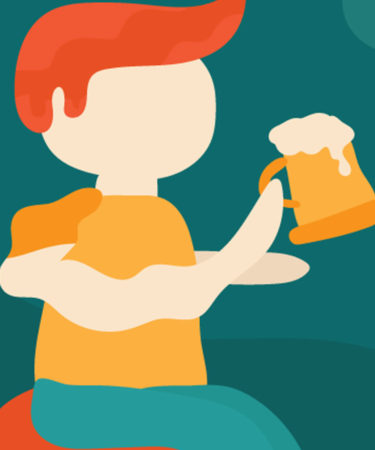Miller Lite was not the world’s first light beer, as many believe, but it was the first successful light beer. Its considerable market share — it’s currently the nation’s third-best-selling beer — was kickstarted by a 1970s advertising campaign that targeted blue-collar men.
This might come as a surprise to modern consumers. Since the 1990s, products like Snackwells, zero-sugar Go Girl Energy Drinks, and Diet Pepsi have unabashedly and, some might-say, condescendingly courted women’s dollars with diet-friendly promises.
Miller Lite, however, reversed sagging sales by going all in on big, burly men. Its 1975 slogan was, “Everything you want in a beer. And Less.”
Those words were spoken by Matt Snell, a retired athlete and Super Bowl champ who helped Miller Lite skyrocket to fame during initial market tests in 1973. Another ad, in 1975, used baseball hall-of-famers Whitey Ford and Mickey Mantle to promote the manly appeal of Miller Lite.
“Buddy, if we woulda had a great tasting beer that was less filling in the old days, can you imagine where we’d be now?” Mantle asks.
“Yeah,” Ford replies. “The beer drinkers hall of fame.”

The campaign was the brainchild of Miller’s savvy ad agency, McCann Erickson. The company had found that it wasn’t healthy people who wanted lighter beer — it was beer-drinking, sports-watching couch potatoes and bar flies. (Incidentally, Mantle traded teams to Natural Light in 1980.)
Its punt was a resounding success. Miller landed the No. 2 market-share spot in 1975, directly behind its rival, Anheuser-Busch. The latter responded by announcing the launch of its own reduced-calorie beer, Natural Light, in January 1977.
Schlitz also debuted its light lager that year, hiring actor and cowboy hero James Coburn to promote its light beer in a series of Western-themed commercials.
“Schlitz Light” is all he utters, “in a semi threatening macho manner that men admire and women adore,” The New York Times reported in May 1977.

Natty Light followed in accordingly macho fashion. One early ad features “Mission: Impossible” star Peter Graves telling viewers to “Take a Natural Break” from manly pursuits like changing a car tire. (How many macho men does it take to change a tire? Apparently, four.)
After Natty Light, A-B introduced Michelob Light, a light version of Michelob Ultra, featuring actor Ted Danson. In a 1979 commercial, Danson and his companion enjoy the manly pursuit of skeet shooting before taking a break for a beer. (Danson’s still at it, by the way — last year, he appeared in a gentlemanly campaign with Smirnoff.)
Finally, in 1982, Budweiser introduced its third and most successful light beer, Budweiser Light. We all know how those commercials go. This 1982 ad features football players going at each other like antelopes.
The brand’s current “Dilly, Dilly” campaign is no better — in one recent commercial, a medieval man is shamed for showing interest in a marginal beverage, mead. He’s taken to the pit of misery for his preferences.
Miller Lite kept with its macho marketing efforts, too. As recently as 2010, Miller Lite’s “Taste Greatness” campaign featured tone-deaf ads chastising men for not being masculine enough when they ordered light beer that wasn’t Miller Lite. In one ad, a handsome man with a messenger bag is teased for carrying a “purse.” In another, a dude sporting a dad bod is deflated for his lack of conviction and his fashion sense. “When you start caring, just take off your skirt and I’ll give you a Miller Lite,” says the bartender. (In both commercials, the bartender is a hot chick.) In the end, Dad Bod puts on pants and orders the “manly” brand.
The message: Man up and drink Miller Lite.
As disturbing as it is, the most astounding part is how well this is all working. To this day, America’s top three beers are Bud Light, Coors Light, and Miller Lite.
“If they can’t rouse themselves to shed their fat with exercise at least they want to slow the weight gains,” a supermarket manager said of light-beer-swilling couch potatoes in 1998. “If they drink a light beer with their baked chips, they can tell themselves they’re not neglecting their health.” Self-indulgent masculinity prevails.
